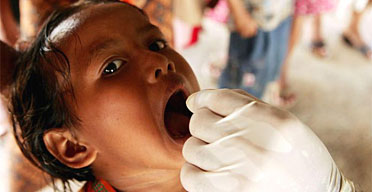
Measles deaths have been slashed by more than half by a concerted campaign that was hailed yesterday as a triumph for global public health and could pave the way for eradication of one of the world's most infectious diseases.
Between 1999 and 2005, there was a 60% reduction in annual measles deaths worldwide, from 873,000 to 345,000, according to United Nations figures reported in the medical journal the Lancet. Africa, where children are most prone to die when they catch measles because of poor nutrition and other infections including HIV, has led the way, with a 75% drop in deaths. In 1999, 506,000 African children died - 90% aged under five. By 2005, the figure had fallen to 126,000.
Partners in the UN's measles initiative, including the World Health Organisation, Unicef, the UN Foundation and the US Centres for Disease Control, are thrilled to have surpassed the target, which was to halve the number of fatalities.
"This is a historic victory for global public health, for the power of partnership and for commitment by countries to fight a terrible disease," said Dr Margaret Chan, the WHO director-general. "In many parts of Africa the results are very visible and very striking. Instead of seeing numerous fresh graves for young children, this is something of the past. Many measles wards have become empty."
Urbain Olanguena Awono, Cameroon's public health minister, described the fall in deaths as a spectacular achievement. "We are winning the fight against measles, which has long killed, sickened and disabled our children," he said. "Our determination is stronger than ever to make measles history by further strengthening our measles control activities, working in concert with our international partners and setting aside resources."
The next goal is even more ambitious - to cut measles deaths by 90% of the 1999 level by 2010. There is even cautious talk of the possibility of ridding the world of measles, but while the eradication of smallpox was a triumph, the long struggle to eliminate the final reservoirs of polio in a handful of countries has shown how difficult it is to stamp out a disease.
Measles eradication could conceivably be stymied not by the developing world, but by dissenters in rich countries such as the UK. Take-up of the combined measles, mumps and rubella jab for young children dropped dramatically after the publication of a paper in 1998 suggesting a hypothetical link to autism. Although the suggestion has been widely discredited, use of the MMR jab has not returned to the 93% level it previously reached. Last June, it was just under 86% in England, and in London it reached only 72.5% - way below the target of 95% the WHO says is necessary to prevent measles outbreaks.
Dr Peter Strebel, a WHO measles control official, said Africans had shown great enthusiasm for the immunisation campaign. "African children who get malnourished and are under pressure from other infections are more likely to die," he said. The networks set up to deliver vaccinations to children were also used to improve and safeguard children's health by distributing insecticide-impregnated bednets against malaria and handing out vitamin A and de-worming pills.
One of the reasons for success was that they learned from the polio eradication campaign, he said. Volunteers could not go house-to-house immunising children because measles vaccine has to be given by injection, not in oral drops. So local volunteers had to round up children to take them to clinics where health workers could inject them.
To reach the 90% goal, the campaign will have to maintain the immunisation levels in Africa and improve them, but the next hotspots are likely to be India and Pakistan, where routine measles vaccination is not the norm. The effort has cost about $300m (£152m) so far. The ambitious new target to cut deaths by 90% will cost up to $500m.

